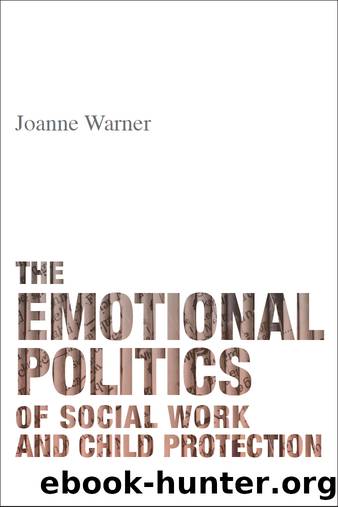The Emotional Politics of Social Work and Child Protection by Warner Joanne

Author:Warner, Joanne [Warner, Joanne]
Language: eng
Format: epub
Tags: Social Science, Social Work
ISBN: 9781447318439
Google: 6cN7BgAAQBAJ
Publisher: Policy Press
Published: 2015-01-12T04:29:24+00:00
However, what is shared across this diversity is âthe privilege and relative power that comes with middle-class identityâ and a shared commitment to cultural reproduction through education (Reay et al, 2013, p 18).
While it is evident that parenting practices vary according to class background, the picture is complex (Sherman and Harris, 2012). What is clear is that important shifts are perceived to have taken place in relation to parenting identities in Western industrialised countries and that these shifts are understood to be the source of considerable anxiety for some parents. The advent of âintensive parentingâ, for example, has involved a shift from the noun of âparentâ to the verb of âparentingâ as an idealised occupation and a process of âself-makingâ (Faircloth, 2010). A climate of âinflated riskâ has produced forms of middle-class parenting in which parents attempt to micromanage risk â often only to perpetuate a sense of insecurity (Hoffman, 2010). In a risk-centred society, âparents feel an inexorable demand to âparentâ as a risk managerâ (Lee et al, 2010, p 299) and, according to Furedi (2002), parenting has become âparanoidâ. In short, the middle-class âusâ location in the âusâ/âthemâ dichotomy appears to be far from stable or secure.
In the burgeoning literature on parenting culture studies (Lee et al, 2014), it is argued that there is a new pervasive form of politicised parental determinism, which, as a form of thinking, is as powerful as economic and genetic determinism (2014, p 217). Parental determinism is defined as âa form of deterministic thinking that construes the everyday activities of parents as directly and causally associated with âfailingâ or harming children and so the wider societyâ (2014, p 3). Parental determinism, it is argued, is historically specific, has emerged in a wider cultural context of risk consciousness and involves understanding the socially constructed nature of parenting. Lee et al demonstrate a growing interest in âparentingâ as the primary means through which children are brought up, as opposed to responsibility being located in the wider community and society. They do this, for example, by noting the rapid increase in sales of books about parenting (2014, p 5). However, for the purposes of this chapter, this literature needs to be considered critically. While âparental determinismâ may be new in the domain of (self)-regulation by middle-class parents, it has long been the fate of poor families, particularly poor mothers, to be subject to deterministic thinking about the threat posed to wider society through the way they bring up their children. The widening of the purview of the state in relation to parenting can be understood as reflecting the shift towards the âsocial investment stateâ where even middle-class families are no longer seen as adequate for maximising the potential of their children as âfuture workersâ and law-abiding, productive adults (Gilbert et al, 2011, p 2011). As Featherstone et al (2014) have argued, when parenting is reconstituted as a job involving expert knowledge and skills rather than as an affective bond, there are particular dangers for people living in poverty.
Download
This site does not store any files on its server. We only index and link to content provided by other sites. Please contact the content providers to delete copyright contents if any and email us, we'll remove relevant links or contents immediately.
| Anthropology | Archaeology |
| Philosophy | Politics & Government |
| Social Sciences | Sociology |
| Women's Studies |
The Secret History by Donna Tartt(19085)
The Social Justice Warrior Handbook by Lisa De Pasquale(12190)
Thirteen Reasons Why by Jay Asher(8909)
This Is How You Lose Her by Junot Diaz(6885)
Weapons of Math Destruction by Cathy O'Neil(6279)
Zero to One by Peter Thiel(5801)
Beartown by Fredrik Backman(5751)
The Myth of the Strong Leader by Archie Brown(5507)
The Fire Next Time by James Baldwin(5442)
How Democracies Die by Steven Levitsky & Daniel Ziblatt(5218)
Promise Me, Dad by Joe Biden(5153)
Stone's Rules by Roger Stone(5087)
A Higher Loyalty: Truth, Lies, and Leadership by James Comey(4960)
100 Deadly Skills by Clint Emerson(4924)
Rise and Kill First by Ronen Bergman(4788)
Secrecy World by Jake Bernstein(4752)
The David Icke Guide to the Global Conspiracy (and how to end it) by David Icke(4717)
The Farm by Tom Rob Smith(4507)
The Doomsday Machine by Daniel Ellsberg(4490)
